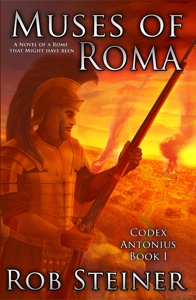 Marcus Antonius Primus began a golden age for humanity when he liberated Roma from Octavian Caesar and became sole Consul. With wisdom from the gods, future Antonii Consuls conquered the world and spawned an interstellar civilization.
Marcus Antonius Primus began a golden age for humanity when he liberated Roma from Octavian Caesar and became sole Consul. With wisdom from the gods, future Antonii Consuls conquered the world and spawned an interstellar civilization.
Three weeks before the millennial anniversary of the Antonii Ascension, star freighter captain Kaeso Aemelius, a blacklisted security agent from Roman rival world Libertus, is asked by his former commanders to help a high-ranking Roman official defect. Kaeso misses his lone wolf espionage days—and its freedom from responsibility for a crew—so he sees the mission as a way back into the spy business. Kaeso sells it to his crew of outcasts as a quick, lucrative contract…without explaining his plan to abandon them for his old job.
But Kaeso soon learns the defector’s terrifying secret, one that proves the last thousand years of history was built on a lie.
Can Kaeso protect his crew from Roman and Liberti forces, who would lay waste to entire worlds to stop them from revealing the civilization-shattering truth?
Rob Steiner's Muses of Roma is unlike any alternate history novel I've ever read. The premise of the novel is simple: Imagine that Rome never fell and is now bent on conquering the stars.
Steiner seamlessly blends historical fact into his story, slightly altering bits, but pulls no punches in this process. This is first evident with the quote preceding the prologue: "I found Roma a city of marble and left it a city of steel" - Marcus Antonius Primus. This is a play on Augustus Caesar's quote "I found Rome a city of bricks and left it a city of marble" (marmoream relinquo, quam latericiam accepi). The book is peppered with enough Latin phrases and tidbits to make the Romanophile in me giddy.
The prologue starts with Marcus Antonius taking the eternal city aided by cannons and muskets. His march through Rome amidst gunfire and smoke is a surreal scene. Steiner goes on to explain that deep in the deserts of Egypt, Marcus Antonius is bestowed upon "by the gods" the secrets of advanced technologies.
One of my favorite lines from the prologue is:
He passed the Circus Maximus on his left; its large walls were pockmarked with musket shots.I found myself trying to imagine what the people of the city would have been thinking as a man leading an army with the power of the gods marched to take the city from a man they worshiped as a god.
The shock of the prologue (especially after the author deftly explains the rapid technological advancement) serves as a warning to the reader that this is going to be a wild ride.
Fast forward 1,000 years and we are on the streets of Roma. The city has all the feel of ancient Rome even after the characters catch a bus. A young woman, Ocella, is trying to smuggle a boy, Cordus, off planet, which is where the true sci-fi aspect of the book takes hold.
We meet Kaeso, former Umbra (secret agent) and captain of the Caduceus, as he is trying to keep his spaceship flying. His crew is a hodgepodge of people running from their pasts all with their own secrets. Kaeso’s own secrets could put the lives of his crew in jeopardy. The interaction between the crew is not unlike the Malcolm Reynolds' crew in Firefly. They fight like a family and would give their lives for their crewmates.
After a disastrous job and an injury to a crew member, Kaeso’s past catches up to him and he is tasked with returning to the eternal city to retrieve Ocella and Cordus. In the process, they discover a millennium's old secret that could change the course of humanity.
I have never gotten so wrapped up in a book. I will be purchasing the remaining books in the series but only once I have time to devote myself to being locked in a room and do nothing but read this. This is not a series that one reads in small spurts. Steiner constantly pulled me in and held me captive for hours on end.
For more information, please visit the author's website and read this interview.
The reviewer purchased a copy of this book. A review was not solicited.
1 comment:
Stone Perales did an excellent job with the cover.
I loved this book (and the series). Glad to see someone else does too. :)
Post a Comment